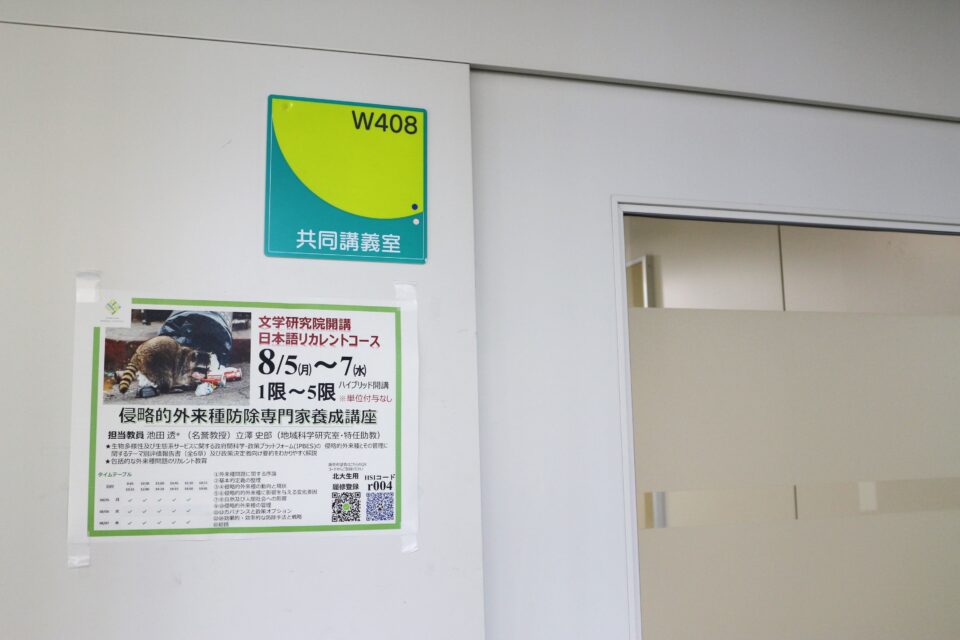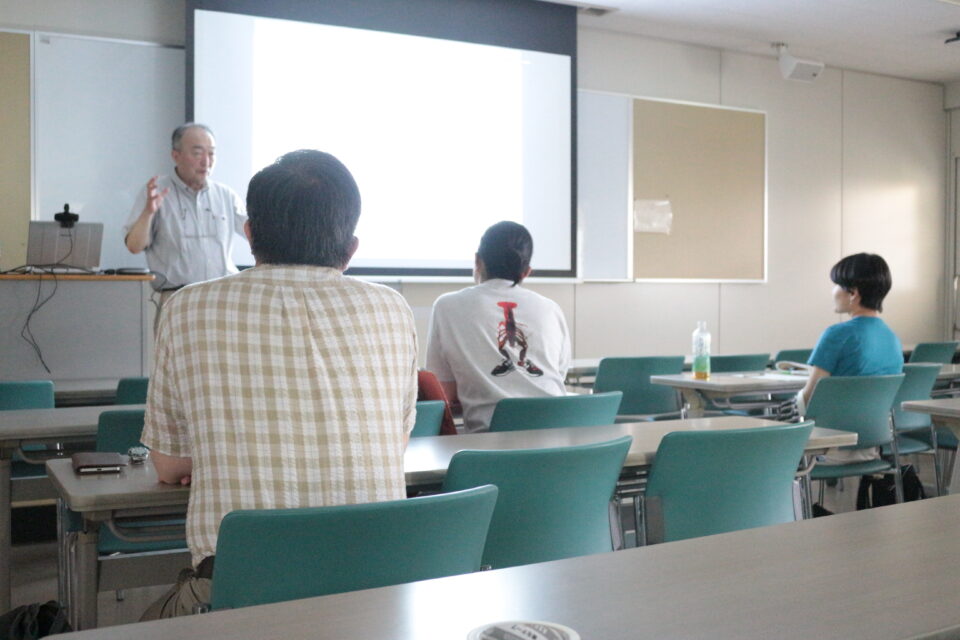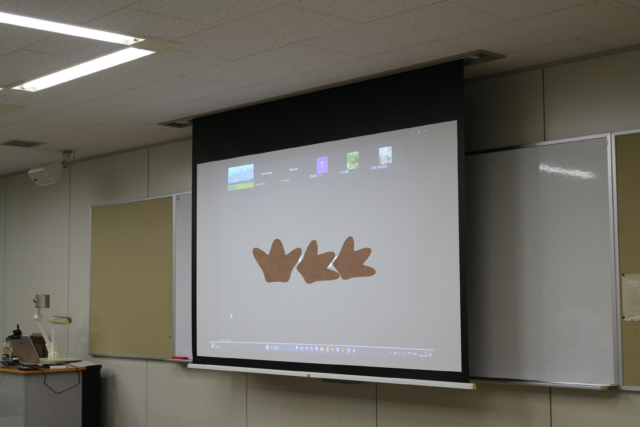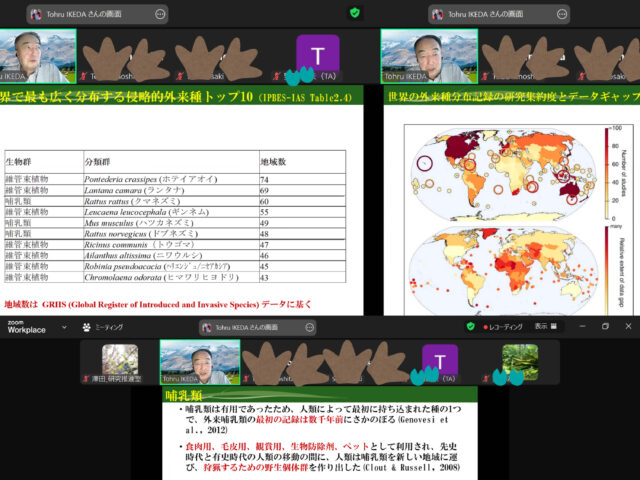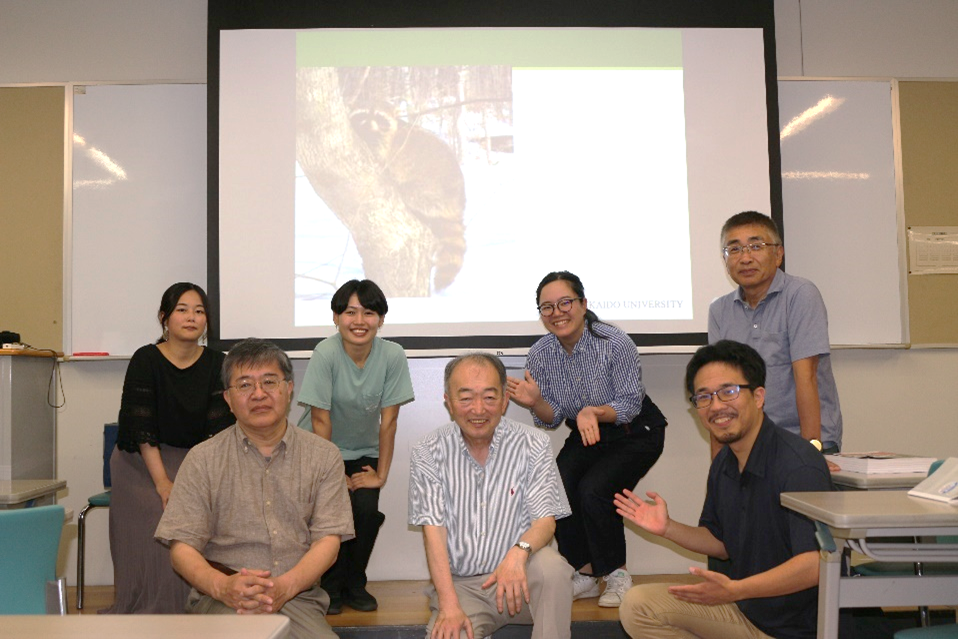“Training Course for Specialists in Invasive Alien Species Management,” a recurrent course offered as part of the Hokkaido Summer Institute 2024 was taught in hybrid format for three days from August 5 to 7.
At the School/Graduate School of Humanities and Human Sciences, under the guidance of Professor Emeritus Tohru Ikeda (former professor in the Laboratory of Regional Science through the 2023 academic year), researchers from New Zealand’s Landcare Research (Wildlife Ecology & Management) have been repeatedly invited since the start of the Hokkaido Summer Institute in 2017. The undergraduate course, “Social Ecology: Principles of Invasion Ecology,” which provides fundamental knowledge of invasion ecology, and the graduate-level course, “Regional Sciences (Lecture): General Theory of Invasive Alien Species Management,” which covers cutting-edge measures and management strategies for invasive alien species, have been offered in English. This year, Professor Tohru Ikeda, who had served as the responsible instructor, was an invited lecturer and launched a recurrent course aimed at training practical specialists in the control of invasive alien species in Japanese, targeting working professionals.
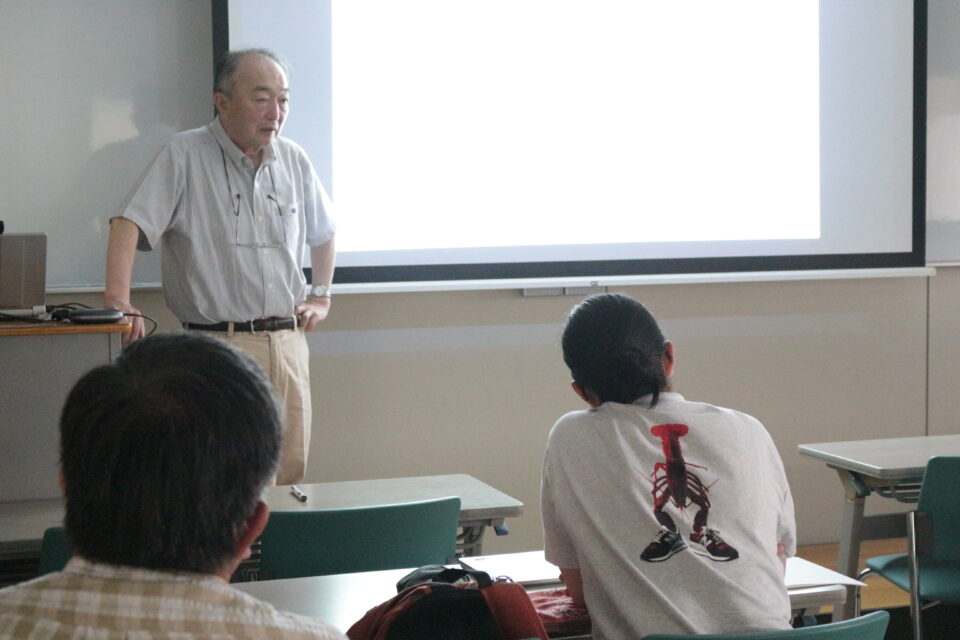
“Over the past 50 years, the entire nature of the planet has been changing at an unprecedented rate in human history. Along with land and sea use changes, direct harvesting of organisms, climate change, and pollution, invasive alien species are highlighted as factors that directly impact biodiversity, necessitating global measures. However, in Japan, there are few universities that systematically address the issue of invasive species, and insufficient sharing of essential theories, countermeasure techniques, and strategies with municipal officials and NGO staff responsible for implementing measures is a problem.” (From the course abstract)
Therefore, this course was designed with the aim of providing comprehensive recurrent education on the issue of invasive species, primarily targeting working professionals currently involved in addressing invasive species issues, to train practical specialists in the control of invasive alien species. The lectures utilized the Summary for Policymakers of the Thematic Assessment Report on Invasive Alien Species and their Control, which was simultaneously released worldwide on September 4, 2023, by the Intergovernmental Science-Policy Platform on Biodiversity and Ecosystem Services (IPBES), as well as a text summarizing the entire six-chapter report that forms its background. Invasive Alien Mammals in Japan: Management Strategies and Ecosystem Conservation (University of Tokyo Press, 2011) and Handbook of Alien Species, edited by the Ecological Society of Japan (Chijinshokan, 2002), were designated as reference books.
The three-day intensive course began with the first period each morning and continued until the fifth period in the evening, offering a packed schedule of 15 sessions for the participants. At the beginning of the first session, before the lecture commenced, Professor Ikeda introduced himself. To achieve the objective of this course, which is to perceive the issue of invasive species as a problem closely tied to our daily lives, consider appropriate control measures, and acquire the necessary techniques and strategies to deal with the problem, the course began with an understanding of the process through which invasive alien species emerge.
The lectures began with an introduction of the issue of invasive species, followed by a discussion of fundamental definitions, trends and the current status of invasive alien species, factors influencing changes related to invasive alien species, their impacts on nature and human society, management of invasive alien species, governance and policy options, and effective and efficient control methods and strategies. The participants learned about the historical background they needed to understand first, going back to a time long before invasive alien species became an issue. They studied which animals and plants moved from where to where, how they were transported, and whether they successfully established themselves in the new locations or failed to do so. Building on that background, the participants then deepened their understanding of the invasive alien species problem, which has become more prominent over the past half-century. They examined the mechanisms and complex factors through which invasive alien species cause damage to ecosystems, society, and the economy, as well as the legal frameworks and policy options necessary to manage invasive alien species. In the latter half of the course, the participants learned how to conduct risk assessment while considering effective control strategies, techniques, and tools. They acquired the skills necessary to develop appropriate control measures, completing the full 15-session lecture series.
The lectures did not only cover the policies of international organizations and the situation in Japan to date, but also introduced advanced measures against invasive alien species that are being implemented in New Zealand as an international case study. These measures, their effectiveness, and future challenges were presented with a wealth of visual materials. While learning about the successes and failures of New Zealand, a fellow island nation with different circumstances from Japan, the participants considered how these examples could serve as references for future efforts in Japan.
During the intensive lecture period, the texts and on-demand materials used in each day’s lectures were shared on Moodle after the final lecture of the day. This system allowed participants to review the materials and deepen their understanding of the lecture content. As this course is a recurrent program conducted in Japanese, university students do not receive academic credits. However, working professionals were assessed based on their submitted reports, and those who passed were awarded a digital badge.
This course, offered for the first time this year, attracted many working professionals, the primary target audience, as well as students from other schools. Over the course of three consecutive days of intensive lectures from morning to evening, the participants learned the fundamental theories, countermeasure techniques, strategies, and other essential knowledge required to become practical specialists in the control of invasive alien species.
It is scheduled to offer this course, aimed at providing shared comprehensive recurrent education on invasive species issues to municipal officials and NGO staff responsible for invasive species management across Japan, and at the training of practical specialists in the control of invasive alien species, again in August next summer.



